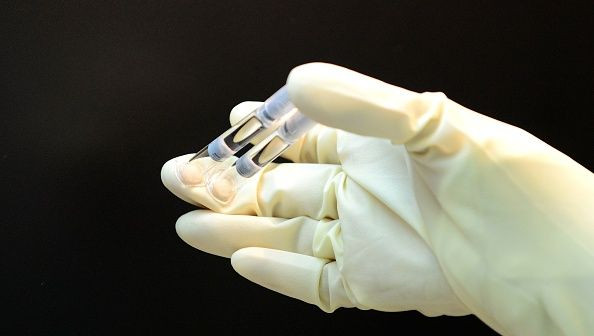A War On High Drug Prices Could Boost Biosimilars
Complex biologic medications that are made in living cells are some of the most expensive drugs on the market, but expiring patents on biologics are putting $100 billion in sales up for grabs by 2020, according to GBI Research. Stealing market share away from costly biologics as they lose patent protection got companies, including Pfizer (NYSE:PFE), Amgen (NASDAQ:AMGN) and Mylan (NASDAQ:MYL) betting big bucks on biosimilars that work similarly, and a new Trump administration proposal this past week could boost biosimilar sales significantly in the future.
Sky-high drug prices
Americans spend about $330 billion on medicine annually, according to the Centers for Medicare and Medicaid Services, and increasingly more of that spending is going toward biologics costing tens of thousands of dollars per year.
The best-selling drug in the world is Humira, a biologic used to treat a variety of autoimmune disorders, including arthritis. It's been on the market since 2002, and a steady stream of price increases and greater use has increased Humira's sales to $19.9 billion in 2018, up 8% from 2017. After rebates (more on those in a minute), Humira costs over $38,000 per year, up from roughly $19,000 in 2012, according to SSR Health.
Humira isn't the only high-priced biologic, either. The development of biologic drugs that cost increasingly more money has sent spending on specialty medicines skyrocketing. The IQVIA Institute estimates that specialty drugs account for about half of the $330 billion Americans spend annually on medication, up from about 25% of spending in 2008. That's extraordinary, given that specialty drugs represent only about 2% of total prescription volume in the United States.
Change is coming
Patent protection is one of the big reasons biologic drugs have enjoyed such remarkable pricing power. It's a relatively new approach to drug development, and most biologics haven't been on the market long enough for their patents to expire, allowing competitors to launch cheaper alternatives.
The monopoly that patents provide to drug developers, however, is starting to disappear. Over the past few years, top-selling drugs, including Johnson & Johnson's (NYSE:JNJ) Remicade, have lost patent protection, and companies including Pfizer have responded by launching biosimilar alternatives. Unfortunately, the uptake of these biosimilars in the U.S. has been slow. Although they're launching with lower list prices, brand-name drugmakers are pulling out all the stops to prevent them from gaining market share.
For instance, by bundling rebates on drugs such as Remicade with other drugs it sells, J&J has kept Pfizer's alternative, Inflectra, mostly at bay. If an insurer wants to pocket rebates that lower its cost per prescription, then it needs to agree to contracts excluding biosimilars or, at a minimum, provide the brand-name biologic with preferential placement on its drug formulary, which dictates how much patients pay at pharmacies.

Manipulating the rebate system in this way is allowing biologic drugmakers to tamp down biosimilar sales, but these schemes may be short-lived. To deliver on promises Donald Trump made during his presidential campaign, Health and Human Services Secretary Alex Azar has proposed legislation that would do away with rebates to insurers and encourage point-of-sale discounts for consumers instead. If this proposal becomes law, it could level the playing field for Pfizer, Amgen, Mylan, and others, giving them a chance to compete head-to-head on price alone.
A big boost?
In Europe, biosimilars are already being commonly prescribed. For example, Remicade biosimilars have captured over 80% of Remicade prescription volume because of price discounts of 50% or more. For perspective, market share for Remicade biosimilars in the U.S. is estimated in the single-digit percentages, and as a result, J&J reported U.S. Remicade revenue of $3.6 billion last year despite their availability.
As patents expire on more biologics, including Humira, which loses protection in the U.S. in 2023, the benefit associated with changing rules so biosimilars can more effectively compete will increase, causing sales at biosimilar drugmakers, including Pfizer, Amgen, and Mylan, to soar.
This article originally appeared in the Motley Fool.
Todd Campbell owns shares of Amgen, Mylan, and Pfizer. His clients may have positions in the companies mentioned. The Motley Fool has a disclosure policy.




















